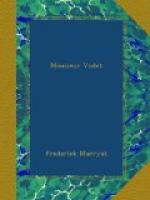The next morning two companies arrived from Monterey, a council was convened, twenty of the citizens forming themselves into a jury. Fonseca was tried and condemned, both as a traitor and a pirate; and as shooting would have been too great an honour for such a wretch, he was hanged in company with the few surviving Sandwichers.
Our party had suffered a little in the beginning of the action, three Mexicans had been killed and eighteen wounded, as well as two Apaches. Of my Shoshones, not one received the smallest scratch; and the Arrapahoes, who had been left to scour the prairie, joined us a short time after the battle with a few scalps.
The people of San Francisco were true to their promise; the rescued booty was divided into two equal parts, one of which was offered to the Indians, as had been agreed upon. On the eve of our departure, presents were made to us as a token of gratitude, and of course the Indians, having at the first moment of their confederation, made such a successful and profitable expedition, accepted it as a good presage for the future. Their services being no longer required, they turned towards the north, and started for the settlement under the command of Roche, to follow up their original intentions of visiting the Shoshones. As for me, I remained behind at San Francisco.
CHAPTER XVII.
Up to the present portion of my narrative, I have lived and kept company with Indians and a few white men who had conformed to their manners and customs. I had seen nothing of civilized life, except during my short sojourn at Monterey, one of the last places in the world to give you a true knowledge of mankind. I was as all Indians are, until they have been deceived and outraged, frank, confiding, and honest. I knew that I could trust my Shoshones, and I thought that I could put confidence in those who were Christians and more civilized. But the reader must recollect that I was but nineteen years of age, and had been brought up as a Shoshone. My youthful ardour had been much inflamed by our late successful conflicts. Had I contented myself with cementing the Indian confederation, I should have done well, but my ideas now went much farther. The circumstances which had just occurred raised in my mind the project of rendering the whole of California Independent, and it-was my ambition to become the liberator of the country.
Aware of the great resources of the territory, of the impassable barriers presented to any large body of men who would invade it from the central parts of Mexico; the more I reflected, the more I was convinced of the feasibility of the undertaking.




